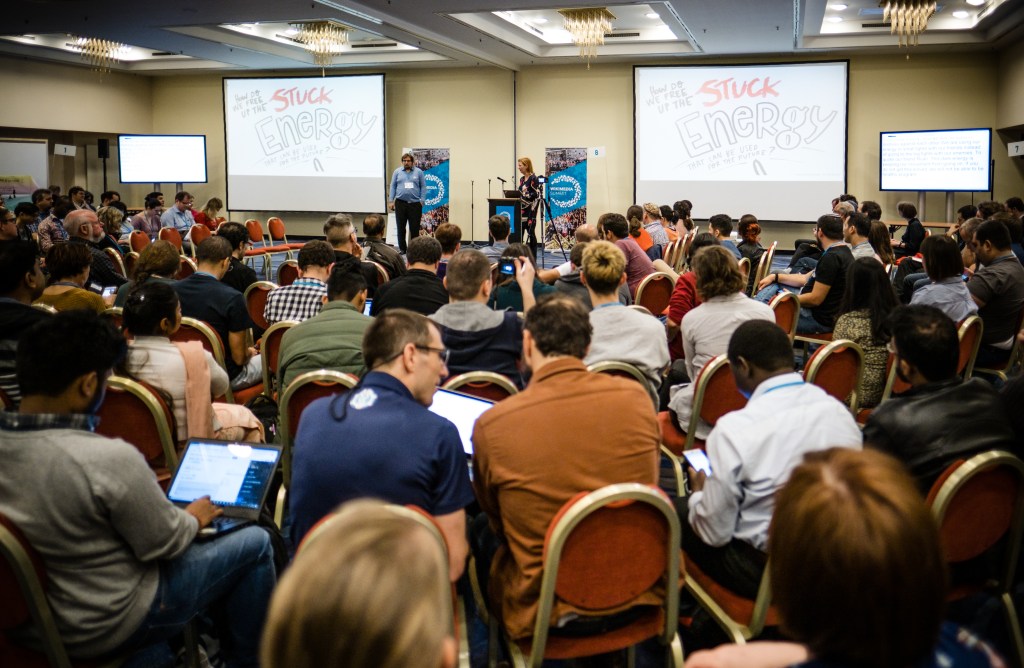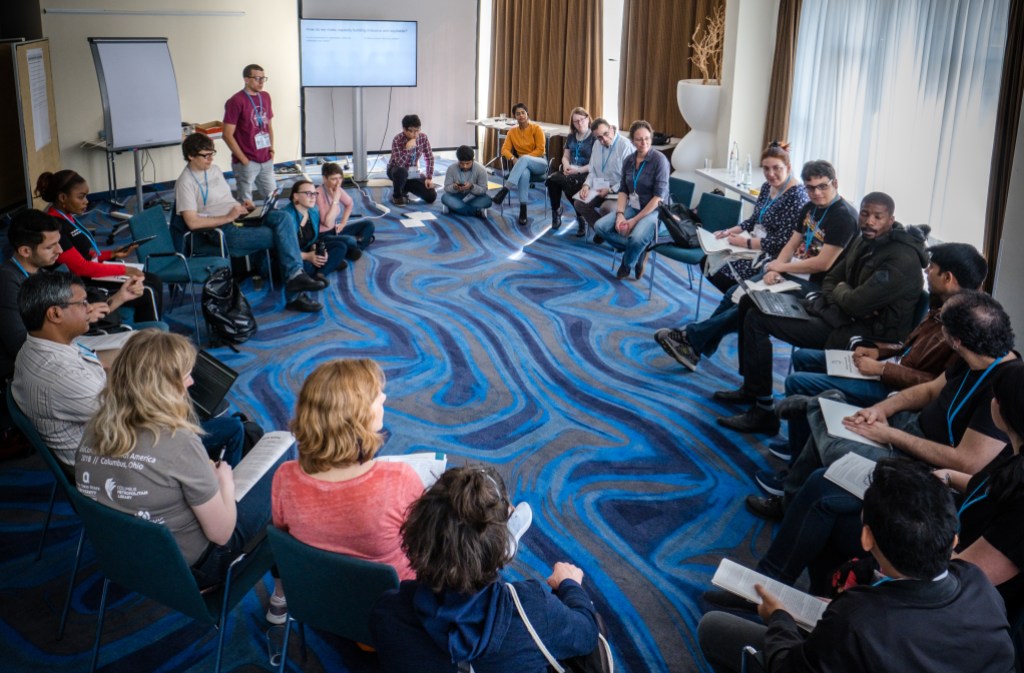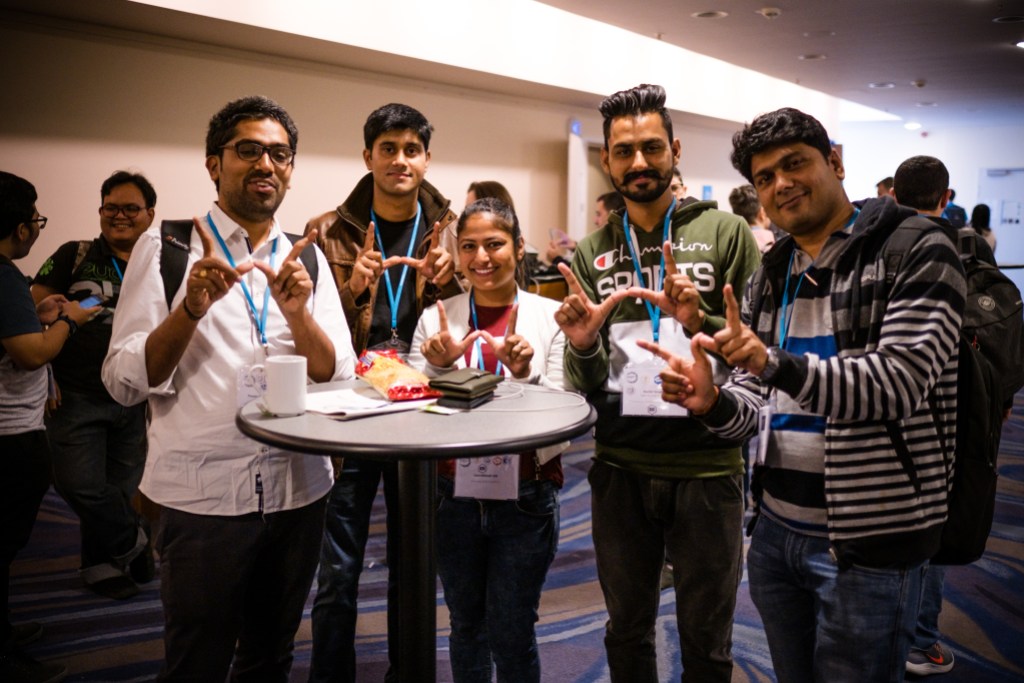What might the future of the Wikimedia movement look like? At the Wikimedia Summit, held in Berlin, Germany, from 29–31 March, around 210 participants from across the globe gathered to find answers to this question.
Over three energetic days, representatives from Wikimedia affiliates, the Wikimedia Foundation, and three Wikimedia committees came together with members of nine movement strategy working groups to discuss how to build the future of the Wikimedia movement and ensure access to more knowledge for more people. Via interactive sessions, open space forums, and conversation circles, participants analyzed research the working groups had produced and key questions they have formulated. Each program element was designed to help find answers to these questions, engage the affiliates in this work, and provide a platform for creating our future together.
“We’re here to work collaboratively on our future”
With a fresh name for 2019, the Wikimedia Summit—formerly the “Wikimedia Conference”—is the annual meeting of Wikimedia affiliates, the Wikimedia Foundation, and three Wikimedia committees, and is hosted and organized by Wikimedia Germany (Deutschland; WMDE). The change of name went hand in hand with a refining of the event’s objectives: to discuss strategy and governance of the Wikimedia movement. This year’s event put the spotlight on the movement strategy, which brings together members from all parts of our community to determine where we as a movement want to go and how we get there.
The Wikimedia Summit got underway with opening speeches that brought the bigger picture into view right from the outset. Michelle Müntefering, the German Minister of State at the Federal Foreign Office, acknowledged the work of Wikimedians in proliferating knowledge and spoke of the importance of reflecting different, diverse perspectives in this “new, democratic global library.” Katherine Maher, the Wikimedia Foundation’s Executive Director, got straight to the point, stating “we’re here to work collaboratively on our future” before Kaarel Vaidla, the movement strategy process architect, and Nicole Ebber, the movement strategy program manager, took the floor to outline how.

Finding the best way to move forward together
As a key gathering for Wikimedia affiliates, the Wikimedia Summit provided working groups a dedicated space to engage with some of their main stakeholders. Its strategy-focused objective saw discussions center on how to advance in our strategic direction and become the essential support system for the whole free knowledge movement. On a concrete level, this was the first opportunity for the working groups to speak directly to affiliates and start developing answers together to sets of guiding questions that the groups have formulated, each relating to a specific thematic area within the movement. Among the key insights that came out of the Summit are that there is a need to turn existing frustration into positive energy; ensure that people are at the core of what we do; and create partnerships and share resources effectively and meaningfully. Some working groups divided into sub-groups to enable them to better interact with the affiliates, and with other working groups.
Day one allowed working groups time to work together while the affiliate representatives were guided through how to use these questions to kickstart conversations about our future as well as ask their questions about the role they can play. The day was capped off by thematic meetups and dinner at WMDE’s offices.

Day two’s program focused on developing content and enriching it with the perspectives and input from Wikimedia affiliates. In a relaxed, open format, affiliates were able to visit each group at designated areas in the venue, discuss the scoping documents and questions, and enhance conversations by providing useful local or thematic insight into the group’s work. The Wikimedia Board of Trustees rounded off the day’s program with their reflections on the path toward our future before the evening festivities got underway at nearby hotspot Villa Neukölln.
After two days of discussions, ideas generation, and exchange, the third and final day of the event focused on how to build on these conversations and develop next steps. Working groups took the input they received on day two and used this to start crafting a plan for action for developing recommendations for structural change within the Wikimedia movement. The event concluded with speeches and insights from Emna Mizouni (Wikimedian from Tunisia), Sunil Abraham (The Centre for Internet and Society), and Ryan Merkley (Creative Commons), who acknowledged the hard work it has taken to get to this point and offered words of encouragement to take us forward. Emna called upon participants take the insights from the Wikimedia Summit and apply them within their context: “We’re the privileged people [who get] to go back to our countries and local communities to deliver what we have been through during these three days.” Ryan spoke to the ambitious nature of collaboratively designing our movement’s future, saying “It’s a rare opportunity that a group this large gets to do strategy… The reason we do it is because it’s better. It takes longer, it’s frustrating, but it’s also more inclusive and we get better ideas.” You can add your voice and your ideas for change. Conversations are currently happening online where you can can share your insights and solutions that will make the Wikimedia movement future ready. Join in on the Meta-Wiki page, on several language wikis, and also via an upcoming survey.
More interaction, more strategy—and more sweets!
The program was designed to be adaptive, and this flexibility enabled all nine groups to connect with the Wikimedia affiliates in numerous ways. It also allowed facilitators to tailor their approach as engagement levels peaked and dropped and frustrations were surfaced. With each shift, facilitators adjusted the design to make sure the program responded to participant needs in real time. Crucially, affiliates had the opportunity to speak to working groups in person about the strategy for our future and develop a picture of how the organized part can contribute. Many commented that this is a necessary process and that being at the Summit had strengthened their own ideas about the future of the movement and motivated people to take these back to their own community.
As the central event to discuss strategy, the Wikimedia Summit provided the perfect forum to collaborate on our future, and the refined focus led to targeted, effective conversations. Fostering interaction lay at the heart of the Summit (aside from the opening and closing, there were no lectures, a first for this event), and this helped create meaningful exchanges between participants. Feedback from the attendees was positive, with people emphasizing the need for the movement to meet and network in person. Beyond the program and format, elements such as the friendly space policy were particularly well received as was the international sweets table (which is exactly as good as it sounds). Thank you to all who attended! We’re already looking forward to the 2020 Wikimedia Summit.
Anna Rees, Project Assistant, International Relations
Wikimedia Germany (Deutschland)
You can find more info about the Wikimedia Summit on Meta and also read more about this year’s event in the Summit report.


Can you help us translate this article?
In order for this article to reach as many people as possible we would like your help. Can you translate this article to get the message out?
Start translation